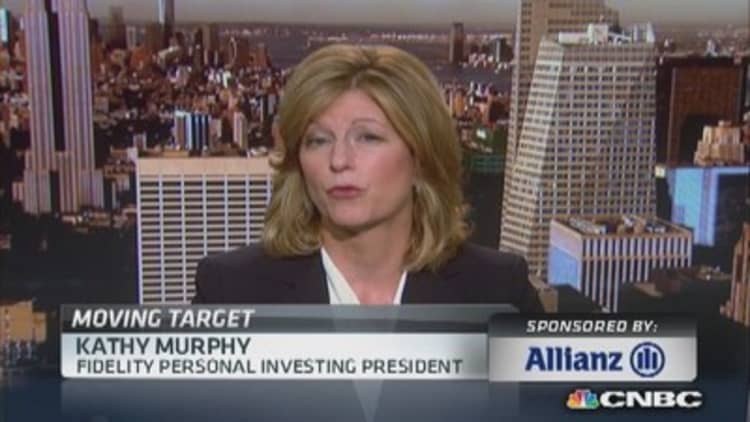Women constitute 51 percent of the population, yet so few advisory firms focus on them that they're considered niche practices.
"There's nobody doing what we're doing in my region: educating and empowering women," said Robin Young, certified financial planner and owner of Northstar Financial Planning. Fifty percent of her practice is women clients, and the other 50 percent is couples.
"We can relate to the juggler role that women have—mom, daughter, caregiver, wife, career—the way they like to receive info, whether by monthly meeting, email or Skype; and whether they want to focus on one thing at a time," she said.
Young was inspired to focus on a female clientele after she left a corporate environment.
Read MoreMuslim advisors invest the Islamic way
"As a woman, I was unable to be on the partner track, because I wanted a different schedule," she said, adding, "Part of my mission now is to help other women have a great career and be with their families. My all-female team members serve as role models to the clients."
Russ Thornton, wealth management advisor with Wealthcare for Women, changed the focus of his practice to women clients three years ago when he found himself working with more and more widows and divorcées, often baby boomers. He felt for them because he remembered the poor financial decisions his mother made decades earlier after her divorce, due to inadequate communication with her advisors.
How do women respond to a male advisor with a woman-focused practice?
"Most women don't really have a preference whether they have a man or woman financial advisor," he said. "They just want to be heard and feel understood."
Different communication needs
Women generally need to discuss their issues and concerns in more detail, advisors say.
"The best thing I can do for them is ask questions and [then] shut up," Thornton said. "I try to let them do 80 percent of the talking."
Certified financial planner Joanie Halfaker, owner of Clarity for Women, said she is "the one that sits down with them and goes through their whole budget."
Read MoreAdvisors find growth in niches
"I feel like I'm almost a counselor. We're not talking about their investment returns; we're talking about their lives," she said.
Halfaker's practice focus was born after a friend, a highly competent professional, became completely overwhelmed by her divorce and its financial issues.

"We deal with life concerns, such as how to talk about money with a child or how to evict a tenant," she said, explaining that her clients "value one-on-one communication, in-office meetings and the ability to call me anytime."
According to certified financial planner Eleanor Blayney, women often differ from men in how they make decisions. "They go slower and ask, 'How will this impact my family?'" she said. Blayney is the consumer advocate for the Certified Financial Planning Board of Standards, working on the organization's Women's Initiative. She is also the author of a planning guide called "Women's Worth."
The CFP Board is a nonprofit organization that looks to foster professional standards for certified financial planners.
Read MorePicking an advisor is serious business
"Often, there's a confidence gap between men and women: Investing causes women more anxiety," she said. "They feel they need to know everything before they make a financial decision."
To address this gap, Thornton at Wealthcare for Women sets two goals for his clients, who are frequently handling their overall finances for the first time.
First, he works with them to make smart decisions, especially in the aftermath of widowhood or in preparation for divorce. Second, he educates them so they won't be taken advantage of going forward.
"Ninety percent of what I do is explaining financial choices," Thornton said, adding, "Clients don't think they have any alternatives. They are so relieved and tell me this is a breath of fresh air."
Read MoreWomen bridging financial literacy gap
Thornton has found that having a more focused approach has helped with referrals, especially when he reaches out to women's groups.
Halfaker at Clarity for Women said, "It makes it easy for someone to refer to me, because I can describe the women I work best with." Her targeted clientele comprises widows, single professional women, women business owners and divorced women.
Many referrals come from divorce attorneys, and some even come from divorcing husbands who refer their estranged wives, she said.
Not 'anti-men'
Halfaker is also quick to point out that she is not "anti-men." She simply wants to be an advocate for women.
So how do the men—usually clients' husbands—feel?
Read MoreWhy advisors should woo Gen Y clients
"This approach doesn't preclude me from serving men—it even resonates with my couple clients," Thornton said.
For her part, Young at Northstar said, "We reach out to the men specifically and listen to their needs, too."
If you are in the wealth management business, you need to be paying attention to the holders of the wealth.Eleanor Blayneyconsumer advocate at the CFP Board
Her team has contacted the firm's male clients via surveys and phone calls. In response to their interests, the practice has added more couple-focused events, opted the men out of the women's blog mailing list and added webinars with a more technical focus.
This niche is bound to grow, leading to more women-focused practices, according to Blayney at the CFP Board. In 2012 the Bureau of Labor Statistics reported that women represented only about 35 percent of personal financial advisors. But Blayney claims this number is increasing.
Women are becoming wealthier, she pointed out.
Read MoreSmall businesses keep it in the family
"They now have retirement assets in their own names and are often out-earning men," Blayney said. "If you are in the wealth management business, you need to be paying attention to the holders of the wealth."
—By Deborah Nason, special to CNBC.com





